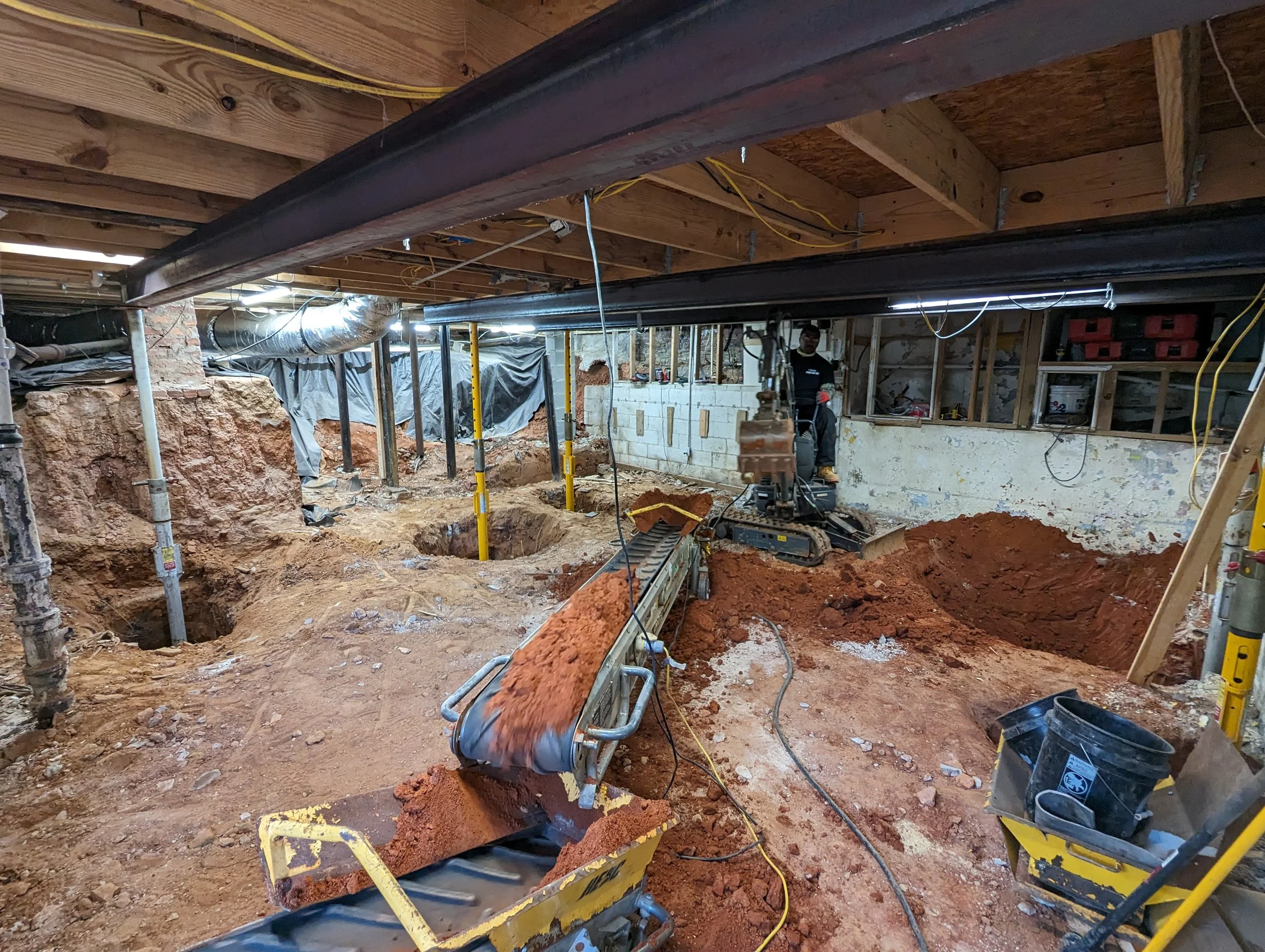Essential Tips for Your Excavated Basement Project
Looking to expand your home’s living space? An excavated basement can boost your home’s value and functionality by adding more square footage. In this guide, you’ll learn about the benefits, costs, and methods involved in basement excavation.
Key Takeaways
Excavated basements enhance living space and property value while being less invasive than upper floor additions.
Selecting the appropriate excavation method is crucial for maintaining structural integrity and ensuring a successful project.
Professional contractors are essential for safe basement excavation, providing expertise in planning, permitting, and execution.
Understanding Excavated Basements
An excavated basement showing the digging process.
Excavating a basement is a powerful way to enhance your home’s functionality and increase its square footage. Adding a basement can double your living space, offering a myriad of possibilities for relaxation, entertainment, or even creating a guest suite. This expansion is less invasive compared to building an upper floor, allowing you to maintain the exterior appearance of your existing home.
The beauty of an excavated basement lies in its flexibility. Whether you need a workout area, a private theater, or additional storage, the space can be tailored to your family’s lifestyle. Unlike adding levels to your home, basement excavation bypasses many zoning issues, making it a practical choice.
Additionally, the process is minimally invasive. Excavating a basement involves digging under the home and making adjustments to the existing foundation, which is often easier than you might think. This approach not only adds value to your property but also keeps your home’s exterior intact.
Ready to See Your Home's Potential?
Creating a basement under your existing home is a transformative way to enhance your living space without changing the exterior. Many homeowners find this method appealing, especially those in urban areas where outward expansion is not an option. A basement excavation can significantly increase your property’s resale value, making it a smart investment.
Before starting this project, assess your home’s structure to determine if it can support a new basement. Work with expert structural engineers, architects, and permitting specialists to navigate local building codes and regulations smoothly.
Our closed, itemized quotes ensure transparency with no hidden costs. Schedule your free consultation today to bring your vision to life.
Key Benefits of an Excavated Basement
A finished basement space showcasing its potential.
A basement excavation significantly increases living space, offering a practical alternative to moving for families needing more room. This extra living space can be adapted to various needs, such as a master suite, home theater, or in-law suite, catering to diverse family dynamics. The additional square footage enhances your home’s market value, making it a valuable investment.
Besides increasing space, an excavated basement offers additional benefits. Basements tend to stay cooler in summer and warmer in winter, which can help lower energy costs. They also provide excellent storage capacity, giving you a dedicated area for belongings and freeing up space in the rest of your home.
An excavated basement can grow with your family. The flexible space can evolve from a playroom for young children to a rental unit or guest suite as your needs change. This flexibility ensures your investment remains useful and relevant over time.
Transform Your Basement with Confidence
From the first consultation to project completion, transparency and expertise are key. Our closed, itemized quotes guarantee no hidden costs, ensuring you can plan your project with confidence. Work with our experienced structural engineers and architects to design a space that meets your specific needs, whether it’s a family room, a finished basement, or a full basement.
Get started today and see how basement excavation can transform your home. Partnering with professionals who manage all city permits and provide detailed assessments ensures you are in capable hands.
Choosing the Right Excavation Method
Heavy equipment used in the excavation process.
Before: Selecting the right excavation method is essential for the project’s success and maintaining your home’s structural integrity. The notable methods include the open-cut method, top-down method, bracing method, anchored method, and island method. Each method has its advantages depending on your home’s structure, soil conditions, and end goals for the space.
After: The notable excavation methods include:
Open-cut method
Top-down method
Bracing method
Anchored method
Island method
Each method has its advantages depending on your home’s structure, soil conditions, and end goals for the space.
For instance, the open-cut method is straightforward and cost-effective, suitable for low-rise structures with available land around the property. On the other hand, the top-down method allows for concurrent construction of upper floors while the basement is being excavated, making it ideal for high-rise buildings. The bracing method offers a more cost-effective and less complex solution, though it’s considered less safe than the top-down method.
Consult a professional engineer to assess soil conditions and structural needs before excavation. The chosen excavation method must keep your home structurally sound throughout the process.
Open-Cut Method
The open-cut method is one of several available for basement excavation. It involves a straightforward, cut-out approach, particularly effective for shallow basements or partial expansions. Cost-effective, this method works best if you have available land around the property, allowing for a larger excavation footprint.
There are two variants of the open-cut method: the slope method and the cantilever method. The slope method is characterized by low costs and downward slope walls, eliminating the need for retaining walls. The cantilever method, on the other hand, allows for deeper basements and is advantageous for projects requiring such depth.
Top-Down Method
The top-down method is ideal for high-rise buildings, where construction occurs simultaneously above and below ground. The method begins with the construction of load-bearing foundation walls. Following that, a concrete floor is laid. A main benefit of the top-down method is its ability to allow upper floors to be built while the basement is being excavated.
This concurrent construction makes the top-down method highly efficient for large projects. It’s ideal for areas where soil stability is a concern, as it minimizes structural disruption during excavation.
Bracing Method
The bracing method involves using horizontal struts to manage earth pressure against retaining walls during excavation. This method is more expensive than the open-cut method but cheaper than the top-down method. It is ideal for properties with limited space or adjacent structures, as it provides support for close-quarters excavation.
The bracing method, although not as safe as the top-down method, is a budget-friendly option for moderate basement depth. This method is cost-effective for smaller projects where safety and space are key considerations.
Let Us Guide You Through Every Step
Our team carefully assesses your home to recommend the best excavation method. We collaborate with structural engineers and handle all city permits for a seamless experience. With our comprehensive support, you can be confident that every step of the process is managed with precision and care.
Contact us to learn more about how we can help you transform your basement space. We are committed to delivering a space that meets your needs and exceeds your expectations, from initial consultation to project completion.
Crawl Space Conversion into a Full Basement
Converting a crawl space into a full basement expands your home’s square footage without extensive excavation. This process involves slightly less digging compared to other types of basements, making it a less invasive option. New plumbing, drainage, and waterproofing must be installed to ensure the new basement is livable.
Another significant benefit of crawl space conversion is the enhanced property value. Adding valuable square footage increases your home’s resale value and creates flexible design options for various needs, such as a quiet office, additional bedroom, or gym.
Benefits of Crawl Space Conversion
Converting an existing crawl space can create valuable additional living spaces in a home. This project can also address household space needs by creating additional bathrooms or bedrooms. With remote work becoming more common, a basement can be converted into a quiet home office.
An excavated basement can serve as a guest suite, providing privacy for visiting relatives, or as an entertainment area or theater, making it a social hub for family and friends.
A basement provides a naturally cool retreat in summer and an insulated space in winter, offering year-round comfort.
Crawl Space Conversion Process
The crawl space conversion process begins with consultation and planning, ensuring compliance with local building codes. Foundation excavation requires lifting the house temporarily to allow for new foundation work. The initial step in excavating a crawl space into a basement is to extend the foundation.
The excavation process involves digging dirt under the home and adjusting the existing foundation. To prevent flooding in a new basement, sufficient drainage must be installed, including systems like a sump pump. Adding plumbing, HVAC, and waterproofing solutions makes the new space comfortable and functional.
Efficient scheduling is crucial, as the crawl space conversion usually takes several weeks, depending on the project’s scope and complexity. By planning carefully and working with experienced professionals, you can ensure a smooth and successful conversion.
Costs Involved in Excavating a Basement
Factors influencing the cost of basement excavation include project size, soil conditions, and structural integrity. Understanding these elements helps homeowners budget accurately and identify reasonable contractor pricing. Excavation expenses typically range from $1,100 to $5,600 on average.
Basement excavation usually requires permits, necessitating contact with local building departments. Assess soil conditions before excavation, as different soil types can affect the foundation’s integrity during the process. Tailored budgeting, considering project size, soil type, and additional services, enables more accurate financial planning.
Understanding the average costs involved can help you prepare for your project better. For instance, budgeting for permits, which typically range from $50 to $400, ensures compliance with local regulations and prevents unexpected expenses.
Cost by Size of Excavation
The typical basement cost range for digging out a new basement is between $22,500 and $45,000. For a 1,000-square-foot basement, the estimated cost ranges from $22,500 to $45,000, depending on the complexity of the project. Excavating a basement can cost between $10,000 and $30,000, often influenced by the size and depth of the excavation.
Variable costs by depth are an important consideration. As excavation depth increases, so do costs, particularly if deeper basements require additional retaining walls or structural support.
If budget constraints are a concern, consider partial excavation or crawl space conversion as alternative solutions to achieve your goals within financial limits.
Additional Cost Considerations
A thorough drainage and waterproofing system is crucial to prevent moisture issues in the newly created basement. Waterproofing is essential to avoid costly moisture issues and should be a standard component of basement excavation. Expect to allocate $4,500 to $15,000 for basement waterproofing to mitigate moisture issues.
Unforeseen costs are another consideration. Be prepared for potential repair or upgrade needs, such as underpinning or additional foundation work, to ensure long-term stability. The cost range for a new foundation when excavating a basement is between $10,000 to $30,000. Repairing drywall or framing damaged during excavation can cost between $50 and $80 per square foot.
Permits for excavation projects generally cost between $50 and $400, depending on the project’s size and location. When converting a crawl space, additional costs may include raising or bracing the house, installing new plumbing, and foundation work. Homeowners may need to budget for unexpected repair costs that can arise during excavation.
Know the Costs Upfront
Transparency is key in planning a basement excavation project. Our closed itemized quotes ensure no hidden fees. By working with a team that manages every detail, from engineering to permits, you can have a stress-free project and focus on the exciting aspects of your new basement space.
Request a quote today to understand the costs upfront and plan your project with confidence. Knowing the total cost beforehand allows you to budget effectively and avoid unforeseen financial burdens.
Ensuring Structural Integrity During Excavation
A structural engineer inspecting an excavation plan.
Maintaining the structural integrity of your home is crucial when excavating a basement to prevent foundation damage. The excavation process requires detailed planning and safety protocols to ensure the home’s structural integrity. Techniques like underpinning or adding retaining walls are often necessary to keep the foundation stable during excavation.
Regular structural checks throughout the excavation process help maintain stability and prevent potential damage. Excavation performed after a house is built is more challenging and requires careful planning to protect existing structures.
A structural engineer plays a vital role in basement excavation by providing design and load calculations for the foundation. Hiring a seasoned excavation contractor is essential when excavating a basement after the home has been built. If a structural engineer is unavailable, consult with the foundation contractor. They can provide valuable insights for your project. Ensuring proper foundation support and monitoring safety throughout the project protects your home’s structural integrity.
Hiring Professional Contractors
Choosing the right excavation contractor is vital for maintaining your home’s structural safety during basement excavation. Experience and expertise in excavation projects are crucial when selecting contractors. Verify a contractor’s reputation through reviews and referrals from previous clients.
Effective communication and customer service are key indicators of a reliable contractor. Contractors should provide a realistic timeframe for project completion to ensure transparency. Discussing insurance coverage with contractors clarifies financial responsibilities for potential damages.
Look for contractors with proven experience in basement excavation and a strong track record of maintaining structural safety. Reliable contractors provide realistic timelines and budgets, ensuring you’re aware of each project phase. Hiring professional contractors ensures your excavation project is completed safely and efficiently.
Partner with the Experts in Basement Excavation
Hiring a professional excavation contractor ensures safe and efficient completion of basement projects while adhering to building codes. A skilled excavation team evaluates site conditions and recommends the most suitable excavation methods based on project needs. Experienced contractors provide comprehensive services from planning and permitting to execution and debris removal.
Safety measures such as shoring systems and proper drainage are essential during basement excavation to prevent accidents. Hiring licensed professionals ensures compliance with local regulations and minimizes risks associated with excavation projects.
From transparent quotes to structural engineering and city permitting, Heide Contracting ensures every project is completed safely, efficiently, and with your peace of mind in focus. Schedule your free consultation today.
Summary
In conclusion, excavating a basement is a transformative project that can significantly enhance your home’s living space and increase its value. By understanding the different excavation methods, knowing the costs involved, and ensuring structural integrity, you can embark on your project with confidence. Collaborating with experienced professionals ensures a smooth and successful excavation process.
If you’re ready to unlock the potential of your home, consider basement excavation as a practical and valuable solution. Partner with experts who provide comprehensive support and transparent quotes to make your basement dreams a reality. Start planning today and transform your home from the ground up.
Frequently Asked Questions
What are the main benefits of excavating a basement?
Excavating a basement greatly enhances your property by increasing living space and property value while providing versatile options for usage, such as guest rooms or home theaters. These benefits make it a worthwhile investment for homeowners.
How do I choose the best excavation method for my home?
To choose the best excavation method for your home, consider factors such as your home's structure, soil conditions, and specific project goals. Consulting with a professional engineer and experienced contractors will provide tailored guidance for optimal results.
What are the costs involved in excavating a basement?
Excavating a basement typically costs between $1,100 and $5,600 for excavation alone, while total project costs can range from $10,000 to $30,000 depending on factors like project size and soil conditions. It's essential to consider these variables when budgeting for your basement excavation.
How can I ensure the structural integrity of my home during excavation?
To ensure the structural integrity of your home during excavation, prioritize detailed planning and conduct regular structural checks. Engaging experienced contractors and consulting with structural engineers is essential for effective techniques like underpinning or adding retaining walls.
Why should I hire professional contractors for basement excavation?
Hiring professional contractors for basement excavation is essential as they bring the necessary experience and expertise to navigate complex regulations and ensure structural safety. This guarantees a thorough and compliant project, ultimately protecting your investment.





